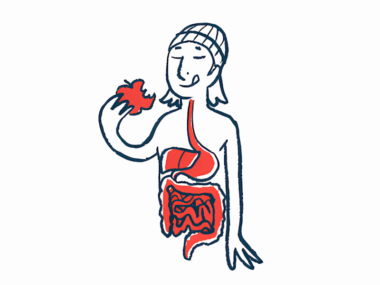Overcoming the shame of prednisone-induced weight gain
For this writer, managing medication side effects requires a proactive approach
Written by |

Note: This column describes the author’s own experiences with prednisone. Not everyone will have the same response to treatment. Consult your doctor before starting or stopping a therapy.
Living with myasthenia gravis (MG), or any rare disease, brings physical and emotional challenges. Since my diagnosis in 2020, I’ve navigated many of these. Lately, my struggle has centered around the shame I feel about my body.
Over the past three years, the drugs I’ve taken as part of my treatment regimen have varied, with one exception: I’ve been taking prednisone nonstop.
While prednisone can help control symptoms of MG, it can also have side effects. Perhaps the best-known of these is weight gain.
Extra pounds may sound like a decent trade-off when one is attempting to control the symptoms of an illness like MG. Without a doubt, prednisone has allowed me to live a fuller life and has helped control the myriad symptoms I’ve encountered since my diagnosis. But I don’t want to ignore the negative health effects of obesity. These can lead to difficulties, too, especially when combined with MG.
Prednisone and weight gain
Before my MG diagnosis, a large part of my self-esteem came from my physical appearance. I was a regular gym rat, and it showed. I kept my body toned and my muscles well developed. Buying clothes was never a problem since stores always carried my size. I was proud, perhaps arrogant about my body. Reflecting on those years, I’m embarrassed. My attitude was not a good one.
My perspective on obesity and body image was in line with that of many Americans. As a society, we often judge and admire others based on physical appearance.
As Werner J. Cahnman wrote in a 1968 article published in The Sociological Quarterly, “In our kind of society, with its stress on affluence and upward mobility, being overweight is considered to be detrimental to health, a blemish to appearance, and a social disgrace.”
The year before my MG diagnosis, work-related issues kept me from my regular workout routine, and I gained 47 pounds. I doubled down on exercise and diet and lost the weight. I was proud of my efforts. My body was “acceptable” again.
MG soon wiped out that pride. During my first six months on prednisone, I gained 62 pounds. I was constantly hungry, and the burning sensation in my stomach was only relieved by ice cream. It became so bad I bought an ice-cream maker. My weight continued to increase. Even though I knew my situation was rough, I couldn’t see a way out of it. I was adrift.
By December 2020, I was on 60 mg of prednisone a day. Another unfortunate side effect of the medication for me was avascular necrosis, or the death of bone tissue, in both hips, which necessitated a double hip replacement.
In the months preceding the surgery, I was unable to walk. Most days, I only moved between the bed and the couch. This inaction resulted in even more weight gain. When I looked in the mirror, I was disgusted by what I saw. I knew this was emotionally unhealthy. Nevertheless, that was the reality, and I retreated into my shell. I stopped having visitors, and when I did venture out, I wouldn’t let anyone take a picture with me in it.
Recently, I learned that an estimated 9,203,354 Americans took prednisone in 2020, according to ClinCalc. I began to think about this. Could that many people be locked in a shell of self-hatred? How many of those individuals are living with obesity and the negative physical and social issues that accompany it?
I haven’t answered these questions. Instead, I’ve decided to take control of my own situation.
Taking a proactive approach to my health
Two weeks ago, my orthopedic surgeon removed the necessary physical restrictions I’d been living with since my hip replacement surgery. With those gone, I’ve resumed working out at the gym and have begun a physical rehab program at a local hospital. I’m also working with a dietitian.
The workouts are rough. I’m unable to exercise with the intensity of my former days. But I am exercising. Each mile on the bike or treadmill leads me one step closer to better physical health. When I lift weights or do situps, I feel better about myself. When I pass up a piece of chocolate oblivion cake, I feel a sense of accomplishment. No longer am I a passive victim enduring the side effects of prednisone. Instead, I’m being proactive and taking better care of my body.
It’ll take many months, if not years, to return to the physical shape I was once in. But I’m determined to get there. And when I do, I hope I’ll have shed the negative stereotypes about overweight people being “lazy” or “weak.”
As former MG News columnist Retha De Wet wrote, “My friends and loved ones stay in my life because of who I am, not because of how I look.” Amen!
Note: Myasthenia Gravis News is strictly a news and information website about the disease. It does not provide medical advice, diagnosis, or treatment. This content is not intended to be a substitute for professional medical advice, diagnosis, or treatment. Always seek the advice of your physician or other qualified health provider with any questions you may have regarding a medical condition. Never disregard professional medical advice or delay in seeking it because of something you have read on this website. The opinions expressed in this column are not those of Myasthenia Gravis News or its parent company, Bionews, and are intended to spark discussion about issues pertaining to myasthenia gravis.







Leave a comment
Fill in the required fields to post. Your email address will not be published.